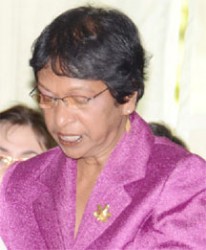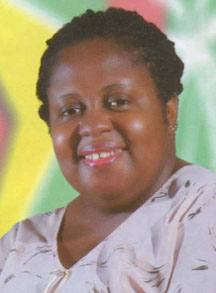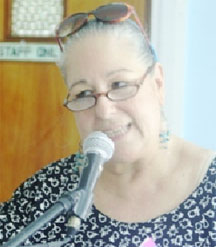Sixty percent of all domestic violence reports made to the Guyana Police Force reach the courts, Deputy Commissioner of Police Balram Persaud recently told members of the Women and Gender Equality Commission, while adding that more support from both victims and the judiciary is needed.
The police have continuously been criticised for the manner in which ranks have been handling domestic violence and child abuse cases but Persaud told members of the commission that the conversion rate for reports is not higher because there is a lack of evidence to take court.
“He indicated that 60% of all reported cases make it to court,” commission member Renata Chuck-a-Sang said Tuesday, while noting that the police also expressed some concerns of their own about issues which affects the manner in which they investigate.

She was at the time addressing a news conference, where the commission also voiced its concern about escalating abuse and sexual harassment in the workplace and the difficulty women face accessing the justice system, among other things.
According to Chuck-a-Sang, who represents the private sector on the commission, Persaud explained that often the complainant is reluctant to attend court and testify because of financial dependence. He, however, also stated that the police force has started to take the position to move forward with the matters regardless.
She further noted that Persaud signalled that the police are expected to change the policy of sending victims of domestic violence for medicals before statements are taken from them, since many times when they are sent for the medicals the victims would not return to the station. With the statement in hand, the police would be able to take the necessary actions.
In the absence of acting Police Commissioner Leroy Brumell, Persaud was one of several officers who met with members of the commission during a scheduled meeting with the Office of the Commissioner of the Police. Among their complaints to the commission was that some magistrates were not committed to the process of dealing with the domestic and sexual violence or in fact did not seem to understand the domestic violence and sexual offences laws as shown by some of their decisions.
“One of the things they [the police] would like to see is our judiciary become more versed or get training in these Acts as they come up…,” Chuck-a-Sang said.

The representatives of the police also spoke about the paper committals process, which sees many perpetrators getting bail before the matter reaches the High Court, thereby resulting in many of them absconding. The police were concerned that they were not consulted when the law was amended to facilitate paper committals.
For their part, the commissioners also suggested that the force collaborate with the University of Guyana (UG) to have each officer on the force be trained in gender relations in order to ensure the police have a better relationship with communities. The commissioners also asked that the force have signboards in police station compounds to indicate the force’s zero tolerance for domestic violence.
On the issue of domestic violence within the police force, Chuck-a-Sang said the commissioners were told that the force has a welfare department headed by Inspector Maxine Graham and serving members can lodge complaints with the department and actions would be taken.
Work place policy
Meanwhile, Gillian Burton, who represents the labour movement on the commission, said that the body is calling on the “powers that be” to have a policy that addresses gender-based violence and sexual harassment in the work place, where such activities have escalated.
“[We are asking] that a policy be put in place to protect persons in the work place. Just as how we have an HIV and AIDS policy for the work place, the time has come for us now to have a work place policy on domestic violence and sexual harassment and gender-based violence in the work place,” she said.

Asked whether the commission has received complaints about work place violence which would have led to its decision to call for a policy, Burton said that “we know” that domestic violence has affected persons in the work place, where relationships may develop. There are also cases of young persons being sexually harassed by their bosses and they have nowhere to turn for help.
“…From time to time, incidents would have occurred and would have been put on a down low, to that extent we are seeking to have a zone, a free space or safe space for all persons. So it is not a case where you would just be able to address violence at home but domestic violence, sexual harassment must be addressed in its entirety, wherever it exists…,” she also said.
Chairperson of the Commission Indra Chandarpal noted that last year the commission had a public forum where it addressed sexual
harassment at work places and the dialogue was started.
She added that at the meetings with the police force and UG, the commission emphasised the need to have those organisations be free from violence and now they are looking towards the policy and then legislation.
Vanda Radzik, who was nominated to the commission by women’s groups, also said that during the meeting with UG Vice-Chancellor Professor Jacob Opadeyi the commissioners recommended that a gender study centre be established at the university. She added that while he was receptive to the idea, the issue of available resources came up. However, she said the commission will continue to press the issue, while pointing out that all that is needed is a director and a secretary for the centre to become a reality.
A diploma or certificate in gender studies as part of the framework of setting up the gender study centre was also recommended and the commission has committed to an award to a UG student to conduct research on women rights and gender issues, which can be used and lodged for reference. The commission has also pressed for UG to be a violence-free and sexual harassment zero-tolerance institution. It was noted that there is no sexual harassment policy in the university’s handbook.
‘No access’

Radzik also spoke about the commission’s outreach in Region Nine, during which it was found that access to justice is at a low ebb and as it is in the other regions. She said there is the important need to have the services that would provide the access to justice and the administration of justice “to make our laws come off the paper and into the lives… of the citizens in those outlining areas in particular.”
Alternatively, until the full gamut of services are made available, Radzik said the commission is recommending that each health worker is trained and equipped to do a rape kit or write a form when presented with a battered woman or abused child.
Meantime, she added that without reservation trafficking in persons exists in the region. “It is real. It is a clear and present danger to put it mildly and I believe that we along with everybody else that has the capacity need to make the interventions that are necessary,” she said.
Nandranie Coonjah, who represents regional women’s affairs on the commission, spoke about a complaint from a woman in Region Two. The woman paid a private lawyer $40,000 to represent her in court in a matter involving her husband but he instead “asked her to be friendly with him.” She eventually got a lawyer from legal aid to represent her and the lawyer she paid in turn represented her husband, Coonjah added. “This is the way that women suffer… not only by their spouses,” she noted.
Chandarpal said while that is just one example, the commission has had many similar complaints where women have paid lawyers and they are not represented.
And Haliena Khan, who represents Region Seven on the commission, said women in that region are calling for representatives from the Child Care & Protection Agency, labour and legal aid. “We are asking that all these services come to Bartica,” she said, while adding that it is difficult for a poor woman to travel to Georgetown to seek the services of legal aid or any other social services.
While a probation officer is located in Bartica, Khan said there is no signboard for her office and this proves to be a difficulty for the many women who would travel from far reaching areas for assistance. According to Khan, persons would pay large sums of money or paddle to reach Bartica and sometimes would leave without seeing the probation officer simply because they don’t know where the office is located.




